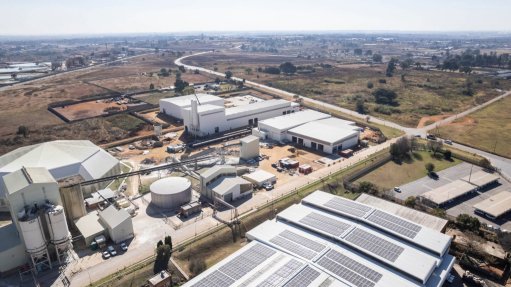Bill aims to bolster SA oil, gas investment


DIRK WESSELS Oil and gas resources will still be needed for many years to come to ensure a sustainable future while considering South Africa’s immediate energy needs
With low investor confidence in the upstream oil and gas sector, pan-African law firm Bowmans affirms that there is a need for the Upstream Petroleum Resources Development Bill (UPRDB), which has been sent to President Cyril Ramaphosa for assent.
The UPRDB – approved by the National Council of Provinces in April – was introduced in 2021 to increase regulatory certainty by separating the regulatory framework for the oil and gas sector from that of the mining sector.
The Bill aims to provide more clarity on licensing requirements, environmental concerns and environmental, social and governance (ESG) standards, says Bowmans partner Dirk Wessels.
“The new government’s intentions are good, but the proposed regulatory changes will take time to filter into the ‘nuts and bolts’, and there is still a myriad of complex regulations to consider and comply with when investing in upstream oil and gas.”
South Africa is focusing heavily on the development of its renewable-energy initiatives to meet its net-zero commitments and as part of this endeavour, the country is “gearing up” to reduce reliance on oil and gas imports, thereby reducing the emissions produced during air or sea freight, adds Wessels.
However, it should be noted that the country is also in the early stages of exploring the development of its oil and gas resources, specifically in terms of attracting investment in the upstream gas sector.
“Oil and gas resources will still be needed for many years to come to ensure a sustainable future when considering the country’s immediate energy needs.”
In terms of the development of renewable-energy initiatives, Cabinet approved the draft update of South Africa’s energy plan, the Integrated Resource Plan (IRP2023), in December 2023, proposing amending the decommissioning schedule for State-owned electricity utility Eskom’s end-of-life coal-fired power stations.
The plan is expected to extend the use of existing coal-fired power stations and to attract the private sector to assist in financing renewable-energy projects.
Similarly, the then Department of Mineral Resources and Energy approved the Renewable Energy Masterplan, which aims to create 25 000 jobs by 2030 and attract R1- billion in investments.
With a focus on solar, wind, lithium-ion and vanadium battery technologies, the plan will also promote local manufacturing, inclusivity and a just transition to a lower-carbon economy.
While the IRP2023 and the Renewable Energy Masterplan are crucial to the realisation of South Africa’s climate change commitments, gas, in particular, is expected to play a crucial role in the energy transition.
Transition Fuels and Investor Interest
Wessels says natural gas is increasingly being viewed as a pivotal transition fuel for South Africa and can act as a bridge between the coal-based energy system and the renewable-energy future.
“Gas is cleaner than emissions-intensive fossil fuels and is a good alternative to fossil fuels as the country builds up its renewable-energy capacity.”
Additionally, another benefit created by gas is the ability for it to be used to complement intermittent renewable-energy resources, such as wind and solar, which bolsters energy security.
The transition status of gas has also boosted investor interest, owing to its ability to assist in the phasing out coal.
Moreover, the depletion of southern Mozambique’s gasfields, and the subsequent warnings of a supply deficit by integrated energy and chemicals company Sasol, will require urgent action to secure other sources and build infrastructure to meet demand.
“This creates further opportunities for investment, but also comes at a risk. However, infrastructure built for gas, such as pipelines, could possibly be reused for cleaner green hydrogen gas in the future,” Wessels points out.
Additionally, a clear regulatory framework in the oil and gas sector, as envisioned by the UPRDB, will provide investors with the confidence to inject capital into infrastructure projects.
However, he notes that the reduction in domestic refining capacity has increased the country’s reliance on imports and created further uncertainty for investors.
The discoveries of gas at the Brulpadda and Luiperd blocks held promise for the sector, but the operational costs, inter-governmental relationships and other commercial realities, such as pricing and offtake arrangements, have made it challenging to make these projects viable.
Wessels points to South Africa’s new National Petroleum Company (SANPC), introduced last month is a merger of South African State-owned institution Central Energy Fund (CEF) and its subsidiaries, gas development company iGas and oil refinery PetroSA, as well as the Strategic Fuel Fund.
The SANPC aims to aid consolidation in the sector and effect a shift towards a more streamlined process, with the company managing and overseeing South Africa’s petroleum resources.
Wessels adds that this should result in projects being more efficient, with better oversight for oil and gas resources. A streamlined approach should also be more attractive to investors, while offering clearer processes for investment and compliance in the sector.
It remains to be seen whether the stakeholders will practically be able to implement the proposed structure in a manner that produces concrete benefits, he concludes.
Article Enquiry
Email Article
Save Article
Feedback
To advertise email advertising@creamermedia.co.za or click here
Comments
Press Office
Announcements
What's On
Subscribe to improve your user experience...
Option 1 (equivalent of R125 a month):
Receive a weekly copy of Creamer Media's Engineering News & Mining Weekly magazine
(print copy for those in South Africa and e-magazine for those outside of South Africa)
Receive daily email newsletters
Access to full search results
Access archive of magazine back copies
Access to Projects in Progress
Access to ONE Research Report of your choice in PDF format
Option 2 (equivalent of R375 a month):
All benefits from Option 1
PLUS
Access to Creamer Media's Research Channel Africa for ALL Research Reports, in PDF format, on various industrial and mining sectors
including Electricity; Water; Energy Transition; Hydrogen; Roads, Rail and Ports; Coal; Gold; Platinum; Battery Metals; etc.
Already a subscriber?
Forgotten your password?
Receive weekly copy of Creamer Media's Engineering News & Mining Weekly magazine (print copy for those in South Africa and e-magazine for those outside of South Africa)
➕
Recieve daily email newsletters
➕
Access to full search results
➕
Access archive of magazine back copies
➕
Access to Projects in Progress
➕
Access to ONE Research Report of your choice in PDF format
RESEARCH CHANNEL AFRICA
R4500 (equivalent of R375 a month)
SUBSCRIBEAll benefits from Option 1
➕
Access to Creamer Media's Research Channel Africa for ALL Research Reports on various industrial and mining sectors, in PDF format, including on:
Electricity
➕
Water
➕
Energy Transition
➕
Hydrogen
➕
Roads, Rail and Ports
➕
Coal
➕
Gold
➕
Platinum
➕
Battery Metals
➕
etc.
Receive all benefits from Option 1 or Option 2 delivered to numerous people at your company
➕
Multiple User names and Passwords for simultaneous log-ins
➕
Intranet integration access to all in your organisation


















